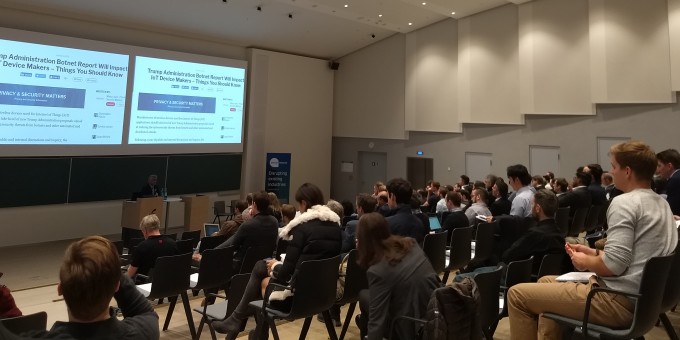
East-West Cryptobridge Conference was held in Frankfurt 22-23 October and we (Cryptotexty) were lucky to attend it, as well as several other meetups which were held in different locations during German Blockchain Week.
The first day of East-West Conference had a focus on Technology and ecosystem.
The conference took place in Frankfurt School and it started with welcoming words by Prof. Philipp Sandner who spoke about classification of tokens and trends in token markets. Prof. Sandner is the head of the Frankfurt School Blockchain Center at the Frankfurt School of Finance & Management and also Advisor in the project Hycon, whose team lead Niall Moore was the second speaker and spoke about insights into the infinity project of Hycon.
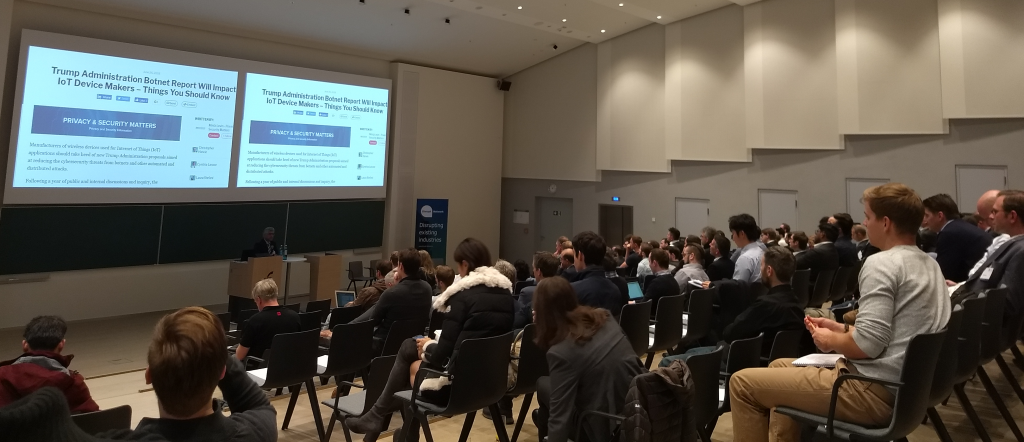
Prof. Sebastian Faust (from Technical University Darmstadt) spoke about the Perun project: bringing scalability and security to blockchains. Prof. Ahmad-Reza Sadeghi from the same university spoke about things, threats and trusts: on blockchaining the internet of things.

Dr. Rachid El Bansarkhani (CEO of QuantiCor Security) spoke about quantum computing and the (in)security of cryptography and blockchains in the era of quantum computers. In 1982 Richard Feynman, American theoretical physicist came with idea to build computers based on quantum mechanics. While its hard to predict when quantum computers will be created (Michele Mosca says it’s 1/6 chance it happens in the next 10 years) the security questions might be solved applying Quantum computer-resistant cryptography (PR-Crypto).
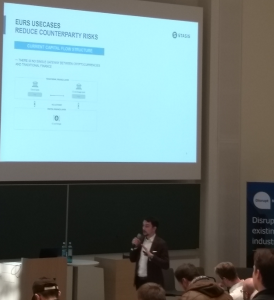 Gregory Klumov (CEO & Founder of STASIS) spoke about Euro on Ethereum: How EURS will bring stability into the European crypto market. Gregory told about the emergence of new asset class liquid alternatives, compared the inflow of institutional capital in classic industry vs cryptocurrencies, analyzed the volatility of returns and liquidity shortages in cryptocurrencies and spoke about EURS stablecoin with usecase examples (i.e. arbitrage). Some of their partners bought 3 million of EURS just to transact. Gregory says that Bitcoin is art confirmed by mathematical algorithm. At the end of speech STASIS founder presented mobile wallet and even made giveaway – those who would download wallet and send e-mail received 10 EURS. I did it for testing and received this amount to my wallet, I was able to easily send EURS from the wallet and exchanged it on Kuna to UAH (Ukrainian hryvnya), the rate was similar to 1 EURO and those who are interested in stablecoins can check the graph on Coinmarketcap.
Gregory Klumov (CEO & Founder of STASIS) spoke about Euro on Ethereum: How EURS will bring stability into the European crypto market. Gregory told about the emergence of new asset class liquid alternatives, compared the inflow of institutional capital in classic industry vs cryptocurrencies, analyzed the volatility of returns and liquidity shortages in cryptocurrencies and spoke about EURS stablecoin with usecase examples (i.e. arbitrage). Some of their partners bought 3 million of EURS just to transact. Gregory says that Bitcoin is art confirmed by mathematical algorithm. At the end of speech STASIS founder presented mobile wallet and even made giveaway – those who would download wallet and send e-mail received 10 EURS. I did it for testing and received this amount to my wallet, I was able to easily send EURS from the wallet and exchanged it on Kuna to UAH (Ukrainian hryvnya), the rate was similar to 1 EURO and those who are interested in stablecoins can check the graph on Coinmarketcap.
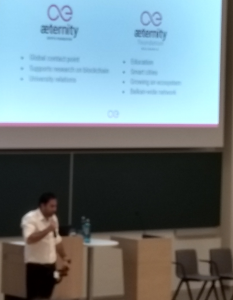 Nikola Stojanow (aeternity) spoke about building decentralized ecosystem, encouraging education, research and development in blockchain, aeternity’s ambassador program.
Nikola Stojanow (aeternity) spoke about building decentralized ecosystem, encouraging education, research and development in blockchain, aeternity’s ambassador program.
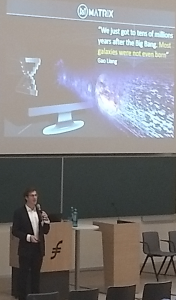
Francisco Arechiga from Matrix spoke about transforming blockchains into massive supercomputers for human welfare. Matrix aims to turn the pooled computer power of the blockchain into an open supercomputer.
According to Francisco there are 3 ways how Blockchain can help AI:
- 1) Provide more accurate and complete data
- 2) Ensure an accurate verified sequence
- 3) Provide pooled computing power for AI processing and modeling.
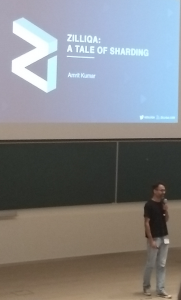 Amrit Kumar, Head of research in Zilliqa spoke about tale of sharding.
Amrit Kumar, Head of research in Zilliqa spoke about tale of sharding.
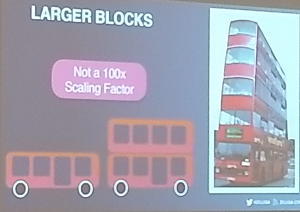
Throughput of blockchains nowadays is not comparable with throughput of payment systems (such as VISA), Congestion, GAS price (which was up to $50 in times of Cryptokitties), the limit of scaling which can be seen in this example with bus. Zilliqa plans to solve all these problems with offchain solutions and payments with sharding.
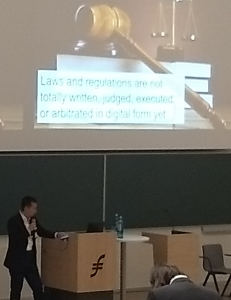 Johnson Zhao, general manager of NEO Global Development started his speech with the questions: “What is smart contract? What is stablecoin? What is compliance”? Good example was How buddhism was introduced all a way from India to China, and nowadays in China there are at least 8 version of buddhism. So Johnson Zhao gave advice to Look for definitions – as it’s most important in the industry.
Johnson Zhao, general manager of NEO Global Development started his speech with the questions: “What is smart contract? What is stablecoin? What is compliance”? Good example was How buddhism was introduced all a way from India to China, and nowadays in China there are at least 8 version of buddhism. So Johnson Zhao gave advice to Look for definitions – as it’s most important in the industry.
Second part of the speech Mr. Zhao spoke about NEO compliance and current developments. NEO’s vision for smart economy is:
- Digitized Economy: currencies, assets, identities, IoTs,
- Programmable Economy: transparent & objective smart contracts
- Trustless Economy: trustless and no middleman
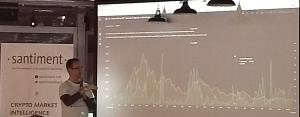 Maksim Balashevich, Founder of Santiment spoke about data analysis in crypto markets and Santiment’s approach. On another day I attended meetup with Korean startups which was organized by Santiment and there Maksim shared even more data. Santiment was founded in 2016 and had ICO in 2017. The company was also presented in expo zone of conference, where everyone could try Santiment’s platform, which is based on big data and community (curated) work. Santiment aims to bring transparency and deep isights into the crypto assets using on-chain, social and curated data.
Maksim Balashevich, Founder of Santiment spoke about data analysis in crypto markets and Santiment’s approach. On another day I attended meetup with Korean startups which was organized by Santiment and there Maksim shared even more data. Santiment was founded in 2016 and had ICO in 2017. The company was also presented in expo zone of conference, where everyone could try Santiment’s platform, which is based on big data and community (curated) work. Santiment aims to bring transparency and deep isights into the crypto assets using on-chain, social and curated data.
 Next was panel discussion on technology issues: Why smart contracts are necessary to provide scalable IoT business models: CEVEN – solutions for different industries. The panel was moderated by Joram Voelklein (Cryplology Asset Group) and participants were: Manfred Krischke (cloudeo), Michael Guzik (Blockchain Valley Ventures), Peter Muller Bruhl (Greencom), Carla Bunger (cbn/ceven).
Next was panel discussion on technology issues: Why smart contracts are necessary to provide scalable IoT business models: CEVEN – solutions for different industries. The panel was moderated by Joram Voelklein (Cryplology Asset Group) and participants were: Manfred Krischke (cloudeo), Michael Guzik (Blockchain Valley Ventures), Peter Muller Bruhl (Greencom), Carla Bunger (cbn/ceven).
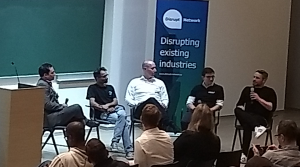 Next panel discussion was about technology issues: current developments, challenges and solutions of the crypto market. It was moderated by Kyle Baron (BCW) and participants were: Holger Koether (IOTA), Jan Heinrich Meyer (DASH), Istvan Deak (NEM), Amrit Kumar (Zilliqa). One of the questions for panelists was about EOS competition (it was declared that EOS is putting 1 billion $ for startups based on EOS) and how projects plan to face this competition. All the projects responded that they are also investing in their startups. Both IOTA and DASH are focused more on DACH region (Germany-Austria-Switzerland), IOTA is allocation 20 million for startups with real use through their EDF (Ecosystem Development Fund), DASH has 10% of block rewards for community projects (which is around 1 mln $ per month) and also they are proud to be most popular cryptocurrency in Venezuela.
Next panel discussion was about technology issues: current developments, challenges and solutions of the crypto market. It was moderated by Kyle Baron (BCW) and participants were: Holger Koether (IOTA), Jan Heinrich Meyer (DASH), Istvan Deak (NEM), Amrit Kumar (Zilliqa). One of the questions for panelists was about EOS competition (it was declared that EOS is putting 1 billion $ for startups based on EOS) and how projects plan to face this competition. All the projects responded that they are also investing in their startups. Both IOTA and DASH are focused more on DACH region (Germany-Austria-Switzerland), IOTA is allocation 20 million for startups with real use through their EDF (Ecosystem Development Fund), DASH has 10% of block rewards for community projects (which is around 1 mln $ per month) and also they are proud to be most popular cryptocurrency in Venezuela.
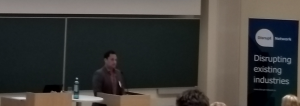 Then Kyle Baron spoke about Asia on chain: Current market trends and developments in key Asian countries. According to him trends can be seen in Next Gen Platforms which help in moving away from Ethereum, and also in other infrastructure projects, E-gaming, Exchanges, NFT, STOs. Asia is the region for mass adoption, the projects need to resonate locally and remember that Patience is the virtue.
Then Kyle Baron spoke about Asia on chain: Current market trends and developments in key Asian countries. According to him trends can be seen in Next Gen Platforms which help in moving away from Ethereum, and also in other infrastructure projects, E-gaming, Exchanges, NFT, STOs. Asia is the region for mass adoption, the projects need to resonate locally and remember that Patience is the virtue.
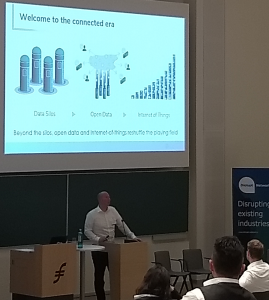 Holger Koether told how IOTA is enabling the machine economy. By 2025 the IoT will exceed 100 billion connected devices each with a dozen or more sensors collecting and sending data. That’s about 12 devices for each man, woman and child. With such statistics it’s easy to agree that data – is the new oil. There are still few things missing to enable this Smart revolution: Trust in data, Realtime transactions, Smart business models. Holger recounted about overcoming the limitations of blockchain – open source DLT beyond blockchain which will fit the Internet-of-things, also he named some examples of Smart Manufacturing (Fujitsu), Smart Energy (Elaadnl), IOTA and the European smart city consortium, IOTA Foundation Ecosystem.
Holger Koether told how IOTA is enabling the machine economy. By 2025 the IoT will exceed 100 billion connected devices each with a dozen or more sensors collecting and sending data. That’s about 12 devices for each man, woman and child. With such statistics it’s easy to agree that data – is the new oil. There are still few things missing to enable this Smart revolution: Trust in data, Realtime transactions, Smart business models. Holger recounted about overcoming the limitations of blockchain – open source DLT beyond blockchain which will fit the Internet-of-things, also he named some examples of Smart Manufacturing (Fujitsu), Smart Energy (Elaadnl), IOTA and the European smart city consortium, IOTA Foundation Ecosystem.
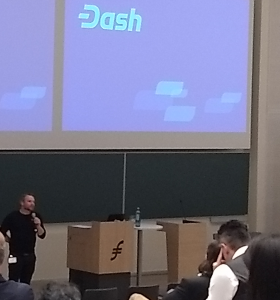 Jan Heinrich Mayer spoke about DASH Embassy and the Dash DAO.
Jan Heinrich Mayer spoke about DASH Embassy and the Dash DAO.
Ryan Wang (MOAC) had a speech titled: “Scaling with the mother of all chains”
Next speaker was Georg Runge with the speech “everiToken: The world’s first token-customized public chain – born for the token economy”.
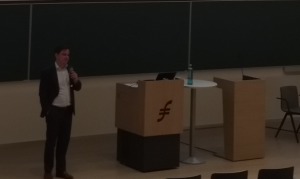
Dr. Matthias Hirtschulz (d-fine) spoke about Crypto custody:secure storage of digital assets.
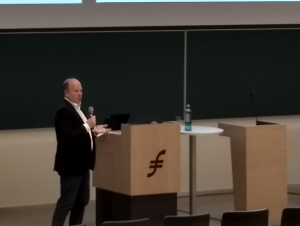 Christian Kallenbach (Coinbau) recounted about enterprise class modular deployments.
Christian Kallenbach (Coinbau) recounted about enterprise class modular deployments.
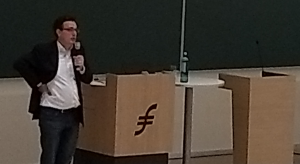 Closing address was by Prof. Philipp Sanders from Frankfurt School Blockchain Center.
Closing address was by Prof. Philipp Sanders from Frankfurt School Blockchain Center.
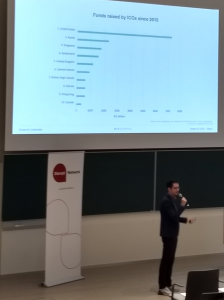 Second day of East-West Conference had a focus on investment and regulation. The conference opened with welcoming words about the future of ICOs by Sergej Stein (DLT Capital).
Second day of East-West Conference had a focus on investment and regulation. The conference opened with welcoming words about the future of ICOs by Sergej Stein (DLT Capital).
 Moritz Jager spoke about miner economics and his company Northern Bitcoin.
Moritz Jager spoke about miner economics and his company Northern Bitcoin.
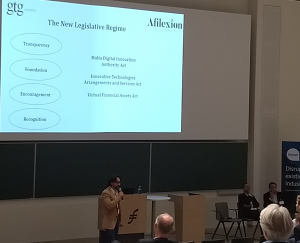 Dr. Alex Grech (Malta Government Advisor), Ian Gauci (GTG Advocates), Wayne Grixti (Malta Digital Innovation Authority) conducted great presentation about Blockchain Taskforce Malta: Regulatory framework of Malta and blockchain adoption in the public sector.
Dr. Alex Grech (Malta Government Advisor), Ian Gauci (GTG Advocates), Wayne Grixti (Malta Digital Innovation Authority) conducted great presentation about Blockchain Taskforce Malta: Regulatory framework of Malta and blockchain adoption in the public sector.
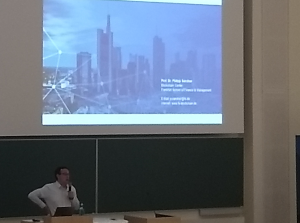 Christian Angermeyer (Cryptology asset group) and Prof. Philipp Sandner (FSBC) spoke about fireside chat: State of crypto and investments of a large-scale funds.
Christian Angermeyer (Cryptology asset group) and Prof. Philipp Sandner (FSBC) spoke about fireside chat: State of crypto and investments of a large-scale funds.
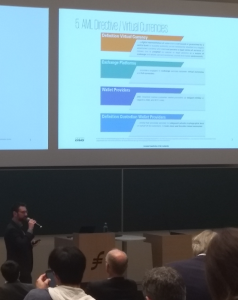 Lutz Auffenberg from KMPG discoursed about Anti Money Laundering in the European crypto market: Status Quo, challenges and risks.
Lutz Auffenberg from KMPG discoursed about Anti Money Laundering in the European crypto market: Status Quo, challenges and risks.
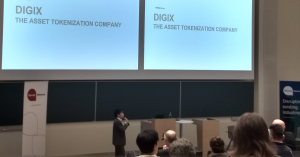 Anthony Eufemio spoke about Digital gold on the blockchain with Digix.
Anthony Eufemio spoke about Digital gold on the blockchain with Digix.
 Anton Golub (Flovtech) recounted about Crypto investment funds in Switzerland and market making on exchanges.
Anton Golub (Flovtech) recounted about Crypto investment funds in Switzerland and market making on exchanges.
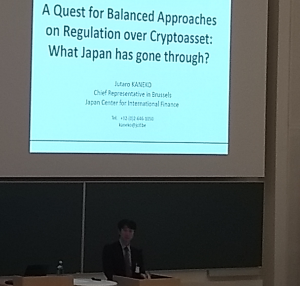 Jutaro Kaneko (Japan Center for International Finance) spoke about Japan’s regulatory and supervisoty approach on crypto assets.
Jutaro Kaneko (Japan Center for International Finance) spoke about Japan’s regulatory and supervisoty approach on crypto assets.
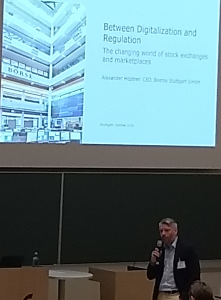 Alexander Hoptner (Borse Stuttgart) had a speech about Building financial markets complying with regulatory requirements for the future: crypto assets and much more.
Alexander Hoptner (Borse Stuttgart) had a speech about Building financial markets complying with regulatory requirements for the future: crypto assets and much more.
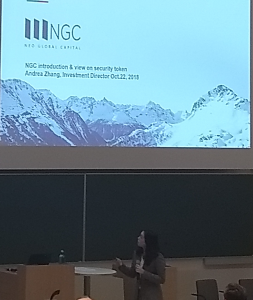 Andrea Hsin Tzu Zhang (NEO Global Capital) recounted about frontier of blockchain investment – security tokens.
Andrea Hsin Tzu Zhang (NEO Global Capital) recounted about frontier of blockchain investment – security tokens.
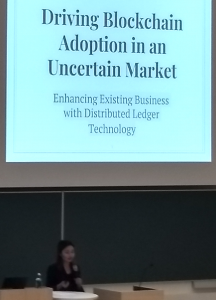 Irene Yu (Blockescence) spoke about Driving Blockchain adoption in an uncertainty market and enhancing existing businesses with blockchain technology.
Irene Yu (Blockescence) spoke about Driving Blockchain adoption in an uncertainty market and enhancing existing businesses with blockchain technology.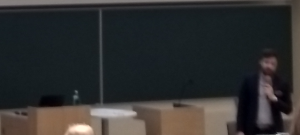
Jerome de Tychey’s (ConsenSys) speech was about Security tokens: bringing securities to the blockchain.
 Florian Wimmer (Blockpit) spoke about compliance and tax reporting of virtual currencies.
Florian Wimmer (Blockpit) spoke about compliance and tax reporting of virtual currencies.
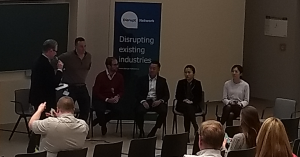 Then there was panel discussion on investment in blockchain: Identifying international investment trends and market opportunities in crypto assets and DLT. It was moderated by Dr. Oliver Krause (Untitled Inc.) and participants were: Alvaro Fernandez (Chainfunder), Patrick Lowry (Iconiq Lab), Jasmine Zhang (Longhash), Darren Camas (Security Token Network), Susan Zhou (QLC Chain), Laurenz Apiarius (Blockwall).
Then there was panel discussion on investment in blockchain: Identifying international investment trends and market opportunities in crypto assets and DLT. It was moderated by Dr. Oliver Krause (Untitled Inc.) and participants were: Alvaro Fernandez (Chainfunder), Patrick Lowry (Iconiq Lab), Jasmine Zhang (Longhash), Darren Camas (Security Token Network), Susan Zhou (QLC Chain), Laurenz Apiarius (Blockwall).
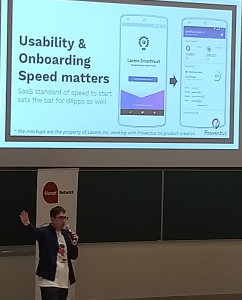
Sebastian Forste and Jurgen Schwendemann from Winheller spoke about regulation and taxation of initial coin offerings and security token offerings in Germany.
Michael Wurzinger (Oath Protocol) told about dispute resolutions based on blockchain protocols.
Alex Krasnov (Provectus) spoke about empowering new kinds of platform business models with the help of decentralization, AI, and other cutting edge technologies.
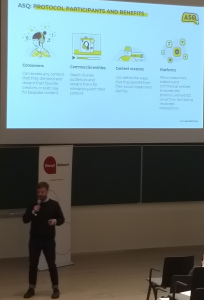 Maxim Tsaryk (ASQ Protocol) recounted how blockchain helps to monetize the content on the ASKfm platform.
Maxim Tsaryk (ASQ Protocol) recounted how blockchain helps to monetize the content on the ASKfm platform.
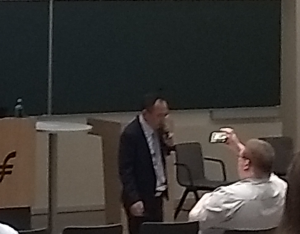
Felix Xia (Amino World) had a speech “From New Zealand to the world: Sharing computer power through smart contracts”
Lennart Wittstock (DLT Camp) spoke about Hackatons: how to build global communities with local hackatons.
Manuel Klein (Disrupt Network) told about decentralized local communities: why are physical communities to allow people meet face to face so important and how can they be built?
Closing address was about developments in D.A.CH. region and especially in Germany, speech was presented by Nico Konrad and Sergej Stein from DLT Capital.
 Bitcoin $63091.15396
Bitcoin $63091.15396  Ethereum $2954.43404
Ethereum $2954.43404  Tether USDt $0.99998
Tether USDt $0.99998  BNB $595.01691
BNB $595.01691  Solana $148.87992
Solana $148.87992  USDC $0.99999
USDC $0.99999  XRP $0.50737
XRP $0.50737  Toncoin $7.1584
Toncoin $7.1584  Dogecoin $0.15049
Dogecoin $0.15049  Cardano $0.44112
Cardano $0.44112  Shiba Inu $2.0E-5
Shiba Inu $2.0E-5  Avalanche $32.86599
Avalanche $32.86599  TRON $0.12613
TRON $0.12613  Polkadot $6.69375
Polkadot $6.69375  Bitcoin Cash $442.0366
Bitcoin Cash $442.0366  Chainlink $13.50321
Chainlink $13.50321  NEAR Protocol $7.31404
NEAR Protocol $7.31404  Polygon $0.66852
Polygon $0.66852  Litecoin $80.97692
Litecoin $80.97692  Internet Computer $11.78971
Internet Computer $11.78971